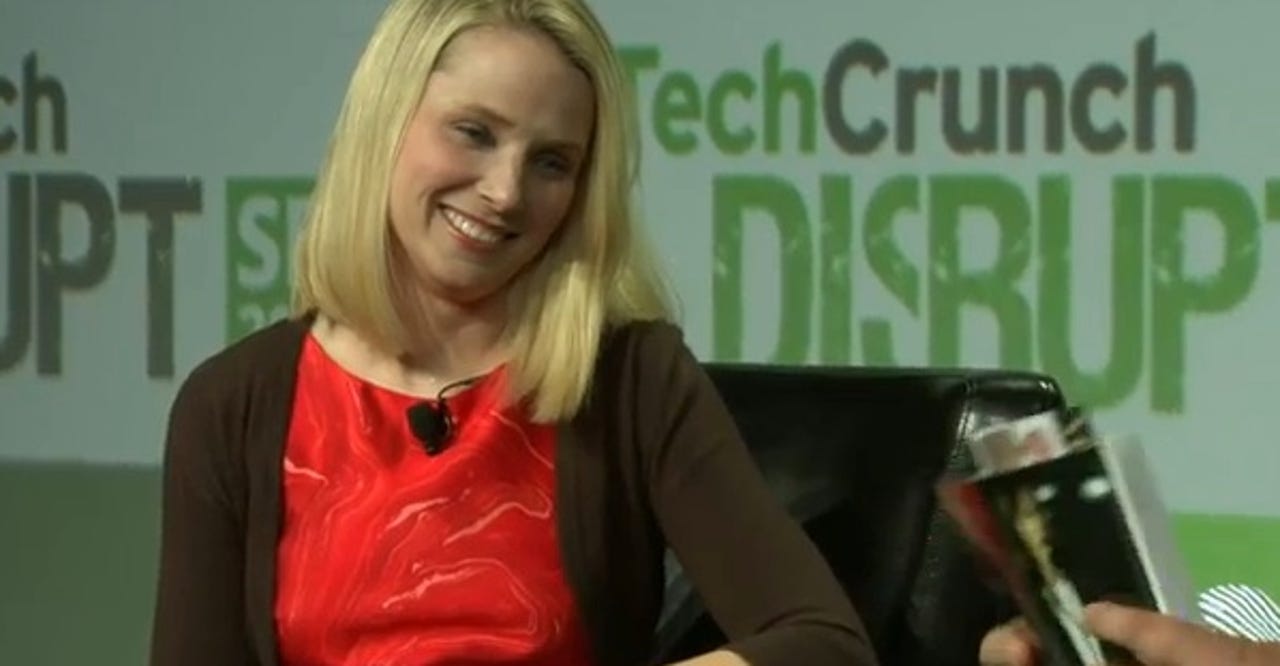Marissa Mayer describes Yahoo as the 'world's largest startup'


SAN FRANCISCO -- Everyone is talking about what a difference a year has made for Facebook (as far as stock is concerned), but it's been quite a year for Yahoo too.
It's also been arguably one of the tech company's better ones (at least from an outsider's perspective) thanks to the hiring of CEO Marissa Mayer.
More from TC Disrupt 2013:
Albeit a few minutes late, Mayer took the stage in front of a full house at the Concourse Exhibition Center at TechCrunch Disrupt 2013 on Wednesday afternoon, chatting with former TechCrunch chief Michael Arrington.
Starting off with some softball topics (i.e. her recent appearance in Vogue and Yahoo's revamped logo), Mayer immediately touted her company as "the world's largest startup."
"When I look at the state of what we're doing inside the company, I have said it is going to take multiple years," Mayer said in describing Yahoo's turnaround, specifying that window will likely last between "three to four years."
During that time frame, Mayer said it comes down to focusing on the following four key strategies: hiring the right people, build the right products, turn that into traffic, which should ultimately lead to higher revenue.
"The products have to be good, otherwise the users don't come and actually use them," Mayer argued.
Mayer joined the then-beleaguered search company in July 2012 after 13 years at Google. Yahoo was already seeing a tumultuous game of musical chairs in its CEO spot before her arrival. Mayer described the first year as one of "modest" growth, continuing on that 2013 has been much more stable.
"Your job as CEO is to grow revenue," Mayer declared. "There are few decisions you need to make, and you need to make them perfectly."
Yahoo now attracts 800 million monthly users (aside from Tumblr, which Yahoo purchased for $1.1 billion back in May), according to Mayer, representing 20 percent growth year-over-year.
Once again reiterating her mantra on tapping into online "daily habits," Mayer highlighted mobile as one of biggest growth spots for Yahoo. Mayer said that there are roughly 350 million people visiting Yahoo's products via mobile devices -- especially the core products such as Yahoo mail and search.
As far as the first pillar goes (hiring the right people), no one can deny Yahoo has been heavily active on that front with dozens of acquisitions this year alone.
Some of those deals have been done to pick up new products and resources to boost some of Yahoo's flailing portfolio (although that's been cut down too), but arguably many of those mergers were done to bring on new talent.
Don't expect that trend to discontinue either, based on Mayer's comments.
"Even separate from the acquisition strategy, we now get 12,000 resumes each week," Mayer said, comparing that to Yahoo's existing employee base, which she said also nears 12,000 employees now.
But to any critics of Mayer's strategy (notably on mobile), she acknowledged she might have already made some mistakes -- but she argued that none of them would have been "make-or-break" mistakes that would bring down Yahoo for good.
"You don't think the best way to serve your users and shareholders is from jail?" Arrington quipped to silence and a smile from Mayer.
"Your job as CEO is to grow revenue," Mayer declared. "There are few decisions you need to make, and you need to make them perfectly."
At the end of the conversation, Mayer briefly responded to Arrington's questions about Yahoo's legal actions following the revelation of its involvement (indirect or not) in the National Security Agency's controversial PRISM data-mining program.
Yahoo has since fought back to declassify documents from 2008 proceedings demonstrating it tried to act in its users' best interests.
Nevertheless, Mayer defended that Yahoo had to comply at the time, dramatically noting that anything else would have legally been considered "treason."
"You don't think the best way to serve your users and shareholders is from jail?" Arrington quipped to silence and a smile from Mayer.
Screenshot via Ustream/TechCrunch